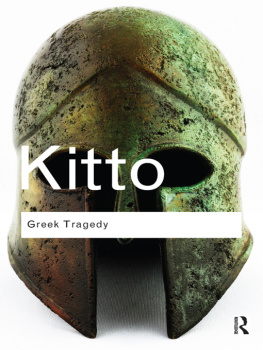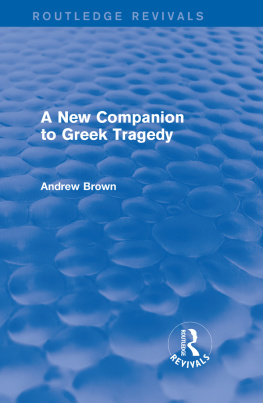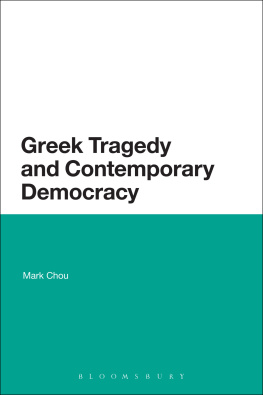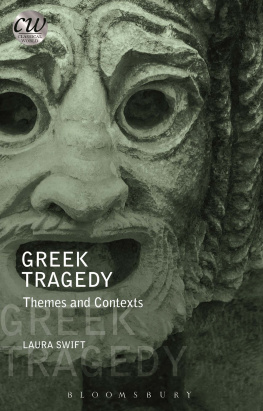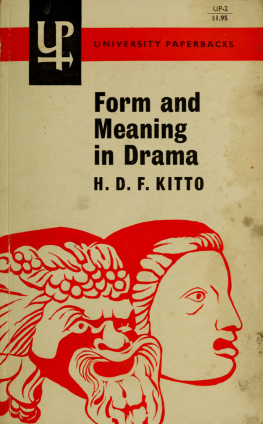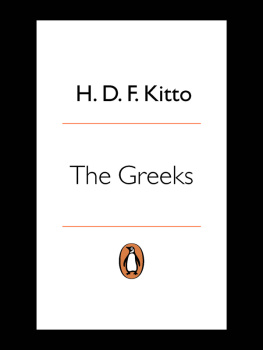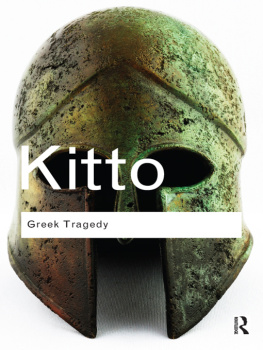Kitto - Greek Tragedy
Here you can read online Kitto - Greek Tragedy full text of the book (entire story) in english for free. Download pdf and epub, get meaning, cover and reviews about this ebook. City: London, year: 2011, publisher: Taylor & Francis;Routledge, genre: Detective and thriller. Description of the work, (preface) as well as reviews are available. Best literature library LitArk.com created for fans of good reading and offers a wide selection of genres:
Romance novel
Science fiction
Adventure
Detective
Science
History
Home and family
Prose
Art
Politics
Computer
Non-fiction
Religion
Business
Children
Humor
Choose a favorite category and find really read worthwhile books. Enjoy immersion in the world of imagination, feel the emotions of the characters or learn something new for yourself, make an fascinating discovery.
- Book:Greek Tragedy
- Author:
- Publisher:Taylor & Francis;Routledge
- Genre:
- Year:2011
- City:London
- Rating:4 / 5
- Favourites:Add to favourites
- Your mark:
- 80
- 1
- 2
- 3
- 4
- 5
Greek Tragedy: summary, description and annotation
We offer to read an annotation, description, summary or preface (depends on what the author of the book "Greek Tragedy" wrote himself). If you haven't found the necessary information about the book — write in the comments, we will try to find it.
Kitto: author's other books
Who wrote Greek Tragedy? Find out the surname, the name of the author of the book and a list of all author's works by series.
Greek Tragedy — read online for free the complete book (whole text) full work
Below is the text of the book, divided by pages. System saving the place of the last page read, allows you to conveniently read the book "Greek Tragedy" online for free, without having to search again every time where you left off. Put a bookmark, and you can go to the page where you finished reading at any time.
Font size:
Interval:
Bookmark:

Two things give Kittos classic book its enduring freshness: he pioneered the approach to Greek drama through internal artistry and thematic form, and he always wrote in lively and readable English.
Oliver Taplin, University of Oxford, UK

Routledge Classics contains the very best of Routledge publishing over the past century or so, books that have, by popular consent, become established as classics in their field. Drawing on a fantastic heritage of innovative writing published by Routledge and its associated imprints, this series makes available in attractive, affordable form some of the most important works of modern times.
For a complete list of titles visit
www.routledge.com/classics
___________________________
The first two editions of this book opened with the assertion that the Supplices is the earliest work of European drama. It now seems possible some would say certain that this is not true; that the trilogy was first produced not in or near 492 B.C. but much later, probably in 464, after the Persae and the Septem . The belief in the earlier dating never rested, of course, on any documentary evidence but chiefly on considerations of style, some of which (as I record with some complacency) I had rejected as evidence of date: namely, that in this play the real protagonist is not an actor but the chorus, and that the second actor is handled rather clumsily. Nevertheless, the general impression of archaism, combined with what Bowra well called the loaded magnificence of the style, seemed reason enough, in the absence of direct evidence, to think it an early play.
This view was indeed challenged, notably by E. C. Yorke. Yorke analysed a certain metrical phenomenon in the seven plays resolution of a long syllable in the iambic trimeter and showed that if the frequency of such resolution increased with the poets increasing years then the Persae (472 B.C. ) is the earliest play, and that the Supplices would fall between it and the Septem (467). But the assumption is hazardous; closer inspection suggests that the dramatic quality of a scene had something to do with the incidence of these resolutions as is certainly the case in Sophocles.
which records names of dramatists apparently in the chronological order of their first successes, and places a certain tos next to Sophocles. If this name was Mesatos, and not for example an unrecorded Stratos or the like, it would agree with the papyrus very well.
The fragment is so carelessly written that the Oxyrhynchus editor said of it There are things about this text which make one sceptical of its authority; and there is another fact which should be taken into account. F. R. Earp, in his Style of Aeschylus (1948), submitted the plays to an exhaustive stylistic analysis. In every one of his statistical tables the Supplices comes out on top, indicating if such evidence has value that it is the earliest of the seven. Nothing led Earp to suspect that it could be later than the Persae , and his results, in other respects, are self-consistent. It has been suggested, as a compromise, that the trilogy was kept in cold-storage for some twenty-five years, for political reasons. Not perhaps impossible, but unlikely, and the reasons adduced seem to me entirely to misjudge the political significance of the play; as will be argued below, it is hard to see what more Aeschylus could have done to make it clear that his Argos was not contemporary Argos.
The nature of the theme (if I have correctly interpreted it) and the power with which it is handled certainly do not suggest the immaturity of youth.Therefore, though without any burning conviction, I accept the evidence of the papyrus at its face value, and turn to more interesting matters.
Some of the older judgements of the play were based in part on the belief that it is a primitive work, partly on a sheer inability to understand a form of drama which is unfamiliar to us. It is natural, but wrong, to approach a work of art with a preconceived idea of what it ought to do, and how; such criticism may go very far astray. The critic tries to read into the play what he expects to find, and when he does not find it he is disappointed. Thus, Tucker found that the Supplices fails in dramatic effect. There is no thrilling action in the piece, and despite its admirable poetry it would have fallen flat but for the spectacular effect of the chorus. Bowra, many years ago now, wrote: Such action as there is consists of their [the suppliants] efforts to secure protection, and the arrival of a herald from Egypt announcing the presence of the rejected suitors a summary which leaves out the situation which makes the play a tragedy. Or, starting with the doctrine that Aeschylus was a religious teacher and the educator of his people, Erzieher seines Volkes, we may say, with Pohlenz, that the play concerns the protectors more than the protected, which is true, and holds up to the Athenian democracy the inspiring picture of a whole people, the Argives, taking upon itself the greatest dangers because it puts religious duty before everything which is not true, since Aeschylus takes some trouble to point out that the King and his people are in a cleft stick: if they will not protect the suppliants, they will have to brave the anger of the offended gods.
By all means let us think some passages in the play clumsy; nevertheless the greater part of it handles a profoundly tragic situation and a familiar one with immense power. Our first duty is to discover where Asechylus laid the emphasis; we may assume that he built the play as he felt it. Certainly, those who find it undramatic cannot tell us, except by accident, what it is about, for they will not have seen the drama.
It begins dramatically enough. The chorus enters, dressed in Egyptian fashion, and chanting to the processional anapaestic rhythm a great invocation of Zeus, the Zeus who protects the Suppliant and has brought these victims of violence safely across the sea from the Nile to Argos; and with Zeus are presently linked the other gods, those of the sky and those of the under-world. The particular situation is being placed in the widest possible context. The parodos gives us the necessary facts easily: Danus, the flight from the suitors, the suppliants own Argive descent. Why they are fleeing from the suitors is not yet made clear; the chorus mentions hybris, and , Right forbids. We are given a clear impression of these young women full of energy, passionate in their resistance, firm of faith in the gods.
The parodos is followed by a long ode. A slow and steady rhythm is started, and the chorus proceeds to dance and sing some 140 verses. There is no suggestion of immediate action, debate or intrigue; the ode, one-sixth of the whole play, would take something like fifteen minutes in performance, the time of an ordinary symphony-movement. This shows what wind is blowing in the theatre: the audience, clearly, is in no hurry to see the actors and action.
Since the rhythms of the poetry give us a slight and distant impression of the nature of the dances and their visual effect, we will give them a little attention. The ode opens, with Zeus and Epaphus, in the stately Dorian rhythm. With the more personal tone of the second pair of stanzas the chorus turns to the impulsive choriambic: 
Font size:
Interval:
Bookmark:
Similar books «Greek Tragedy»
Look at similar books to Greek Tragedy. We have selected literature similar in name and meaning in the hope of providing readers with more options to find new, interesting, not yet read works.
Discussion, reviews of the book Greek Tragedy and just readers' own opinions. Leave your comments, write what you think about the work, its meaning or the main characters. Specify what exactly you liked and what you didn't like, and why you think so.

